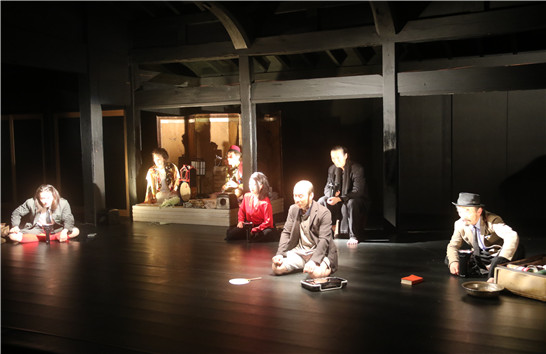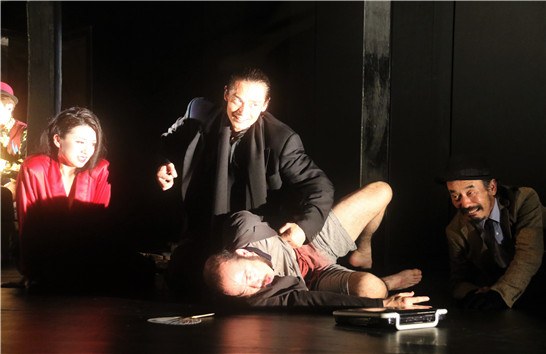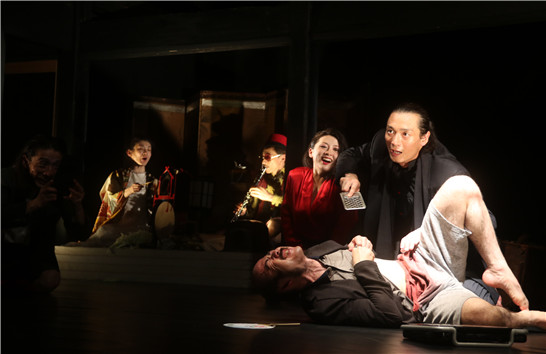Japan
Suzuki Company of Toga (SCOT)
Directed by Tadashi Suzuki
WHEN:
18th Oct. 2018, 20:00
19th Oct. 2018, 19:00
20th Oct. 2018, 14:30/19:00
WHERE: Ancient Courtyard Theatre
Duration: 70 minutes (without intermission)
Performed in Japanese, with Chinese and English subtitles

Reviews
Springtime in the North, Tadashi Suzuki’s new creation, tells the story of a young man who locks himself up in his home. He feels mentally and physically degraded, shutting himself off in his room without communication with his family. But one cannot survive without family bonds and means of expression. As a result, several people lodge in his heart. Although unlike Billy Milligan, who has multiple personality disorder, this young man has three men and a woman staying in his heart-mind, closely stuck to his body, having been born out of his heart.
This play is indeed very interesting. Little by little, the four people corrode the young man’s heart, and ultimately kill him and his parents. Though the young man struggles to resist, all his efforts are in vain. He loses his life in the end. In essence, it is language that deprives one’s heart, and one’s life.
In this piece, we are able to observe Tadashi Suzuki practicing his theory of exploring the physical body. The core of his theory is that one’s inner world may not be in conformity with one’s outer appearance, and the manifestation of this notion in this performance demonstrates a profound development of it. The inflated ego will eventually obliterate the outer reality, in which language plays an important role. That’s fascinating to me.
— Tamotsu Watanabe, “Autumn in Toga,” Theatre

About Springtime in the North (『北国の春』)
In this play, one man realizes a group of people he thought were simply strangers is actually stuck to his body. Over time, they get inside his body and start taking control, so that he begins to act and speak unwittingly. Although previously employed at a large metropolitan insurance company, the man has now completely shut himself off from society, locked up in his room. Like Karatachi Nikki (the first play in the chindonya series), Springtime in the North (『北国の春』) was written around 40 years ago by Nobuo Kazawa. In Tadashi Suzuki’s staging of Karatachi, chindonya musicians tell a tale based on a famous historical incident. In Springtime (『北国の春』), they provide accompaniment for their own family drama, featuring a social critique that surfaces through the psychosomatic plight of the son.
The performance could be described as a character portrait of one who has lost a sense of himself in society: a youth in the midst of an identity crisis.
About Tadashi Suzuki
Tadashi Suzuki is the founder and director of the Suzuki Company of Toga (SCOT),the organizer of Japan’s first international theatre festival (Toga Festival), and the creator of the Suzuki Method of Actor Training. In addition, Suzuki also has also served as General Artistic Director of Shizuoka Performing Arts Center (1995~2007), as a member of the International Theatre Olympics Committee, as founding member of the BeSeTo Festival and as Chairman of the Board of Directors for the Japan Performing Arts Foundation.
Suzuki’s works include On the Dramatic Passions, The Trojan Women, Dionysus, Cyrano de Bergerac, Madame de Sade and several international collaborations such as The Tale of Lear, King Lear, Oedipus Rex, and Electra.
Suzuki has articulated his theories in numerous books, including Culture is the Body, and a book written on Suzuki titled The Theatre of Suzuki Tadashi, published by Cambridge University Press. He has taught his system of actor training in schools and theatres throughout the world, including The Juilliard School and the Moscow Art Theatre.
Suzuki is also a seminal thinker and practitioner, whose primary concerns include: the structure of a theatre group, the creation and use of theatrical space, and the overcoming of cultural and national barriers in the interest of creating work that is truly universal.
Suzuki’s activities, both as a director and as a festival producer, reflect an aggressive approach to dealing with the fundamental issues of our times.
Credits
Director: Tadashi Suzuki
Actors: Daisuke Ueta - Daisuke
Michitomo Shiohara - Father
Chieko Naito - Mother
Haruo Ishikawa - Man 1
Masaharu Kato - Man 2
Takato Hiragaki - Man 3
Haruka Kiyama - Woman
Stage Manager: Yoichi Takemori
Assistant Director: Maki Saito
Lighting: Makoto Niwa
Sound: Junya Kobayashi
Costume: Toshimi Mitsuda
Interpreter/Subtitles: Fang Xin
Administrator: Yoshie Shigemasa, Aki Sato-Johnson
This project has been supported by the Japan Foundation.
About Suzuki Company of Toga
In 1976, Tadashi Suzuki relocated his theatre troupe, the Waseda Shogekijo from central Tokyo to Toga, a remote village. Working from a thatched-roof house built in the traditional “praying hands” style, which the group had converted into a theatre, they renamed themselves the Suzuki Company of Toga (SCOT).
Since then the site has grown into a complex of lodgings, rehearsal rooms, and assorted performance spaces, including a studio theatre, a second gassho-zukuri theatre, a black box theatre, an outdoor “rock” theatre, and a spectacular lakeside amphitheatre. It is in these facilities and theatres that the company is run, following the precepts of Tadashi Suzuki and under his direction. Having marked its 50th anniversary in 2015, SCOT holds singular status in Japan, enjoying the backing of both the local and national governments.
Paradoxically, the move from giant metropolis to isolated mountain valley gained SCOT even more followers. Moreover, this special location played host for many years (1982-1999) to the Toga International Arts Festival. Now continuing under the title SCOT Summer Season, it offers concentrated workshops in the Suzuki Method of Actor Training, inviting theatre companies worldwide to perform, live, work, and collaborate with each other. In the true meaning of the word “festival,” the diverse cultures are highlighted and celebrated.
Toga village also serves as a springboard for the international activities of SCOT. Since their first overseas performance at the Théâtre des Nations Festival, the company has performed in more than 84 cities in some 31 countries. In addition, Toga continues to serve as a center for international research activities and for the training of practitioners in the performing arts, as well as an archive of documents and materials pertaining to the performing arts.







